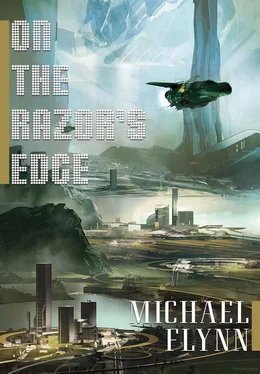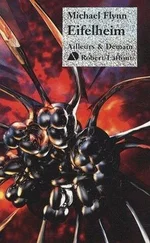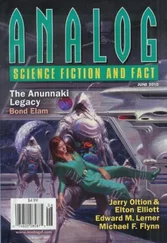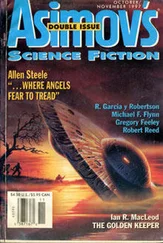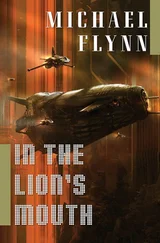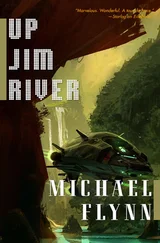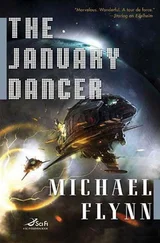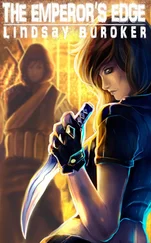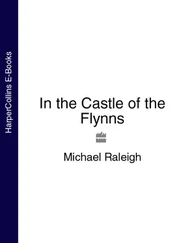«Oh, surely. But we can’t see around the next corner. The genemasters in their heyday did not hesitate to alter men. What might they have done with tigers or other beasts?»
Made tasty and docile meat animals of them,suggested the Pedant.
«That would be the sensible thing to do—sable tiger is delicious—but might they have prepared beasts to await the arrival of the Dao Chettians? Might that not be the reason the Names abandoned the demolition of this place? Perhaps something stands guard here … »
Donovan came to one of the five grand concourses and turned right toward the city center. From left and from right he heard the buzzing like cicadas on a hot summer’s day. He kept one hand on the butt of his teaser.
It’s not following us, the Sleuth decided. It’s in situ. We’re only walking through their midst.
«Through whose midst?»
Before him, though the savannah grasses that partially skirted it, Donovan saw a broad, low building in white marble. It sat on a stone platform, through the blocks of which grasses struggled toward the sun. The platform was reached by a series of shallow ramps alternating with short stairways, and the building façade was lined by pillars in a variety of styles: plain, fluted, intricately decorated, with capitals scrolled, palmate, or historiate. The array ought to have clashed, but it did not. The stylistic cacophony somehow achieved harmony.
In the entablature was in inscription in the old Taņţamiž: Here Are All At Home.
“Do you think it is…?” the Fudir asked himself.
I’m sure it is, sang the young girl in the chiton.
As he rushed up the stair to the patio, Inner Child wondered. «Why was this building, of all buildings, not reduced to rubble by the Names?»
It woulda made more sense,the Brute agreed, to demolish this ’un and leave the rest of the city be.
The snap-crackle-pop seemed louder as he entered the Hall of Suns and found himself on the top tier of a semicircular amphitheater dug into the farther hillside. Seats and desks lined the concentric tiers facing a dais on the floor below. Columns rimmed the theater, and between them stood bases for statues. Above, a dome extended toward the center, where a gaping hole spoiled its wholeness.
So there had been an attack, but one that had succeeded in no more than smashing through the dome.
Where is the rubble from the dome? the Sleuth asked. It should litter the floor below the hole.
“Scavanged, most likely,” said the Fudir. “There may be villages nearby with hovels built of stone.”
Most of the niches lining the walls were empty, but a few held the stubs of statues and one held a statue entire. Drawn to it, Donovan looked into the smiling and delighted countenance of a man wearing a bulky environment suit. He cradled his helmet in his arm and seemed to have just taken a very deep breath. On the base beneath, Donovan read: Tau Ceti Two: Yang huang-ti , and below that a single line: “We have a second home!”
No other statues were intact, but most of the bases were. A nearby plinth read: New Mumbai: Chettiwan Mahadevan. “Then we have never been alone!”
Donovan hastened to the far left of the semicircle.
Cevvay: Jacinta Rosario. “So this is Barsoom!”
Donovan had always thought Rosario a figure out of myth; but the Commonwealth would have known—unless she had become myth even by then. The first two plinths bore names he did not recognize, even from myth.
Cantiran: Neil Armstrong. “One Small Step for Man!”
And the first plinth …
Akalitamko ṭṭu: Yuri Gagarin. “I see Earth! It is so beautiful!”
These niches, Donovan decided, had once borne the statues of the great captains of old, the first to set foot on the various and sundry worlds of the Commonwealth. Cantiran was the old name of Terra’s moon, Luna. Akalitamko ṭṭu he had never heard of and its root meaning seemed to be “globe running-around.” Earth-orbit,thought the Pedant. The first man to pilot a spaceship, the Sleuth deduced. But Donovan still wondered how many of the older names were true and how many the crust of legend. You could make a statue of a myth as easily as of a man.
He made his way through the crescent tiers. Each seat had a small white-stone podium and on the fronts of the podia were inscribed the weathered names of worlds. In the back row, he found Henrietta on one podium. Farther down, Ashbanal graced another; and about midway to the floor Yuts’ga was inscribed on two adjacent podia.
But he ignored the rest and hurried toward the cluster of seats on the dais, set behind tiers of long benches and facing out toward the rest of the room.
Behind the first bench he found Beta Hydri, 82 Eridani, and Delta Pavonis. Behind the higher bench sat Alpha Centauri, Tau Ceti, 61 Cygni, and Epsilon Indi. Each of them had three seats. The third bench, adorned on its façade with the great starburst of the Commonwealth of Suns, held the five seats of Terra herself, one set higher and in the center. The presider, he assumed.
Sleuth examined the ancient names. Delta Pavonis was obviously Delpaff and 82 Eridani was Old 82. At the second bench, Tau Ceti must be Dao Chetty. The others puzzled him a while longer, but he decided that Alpha Centauri must be one of the Century Suns and Beta Hydri must be Bhaitry. So one of the other two was undoubtedly New Vraddy and the other New Mumbai, although as to which was which he was unsure.
Everything seemed arranged in order of precedence. The Century Suns had lain nearest to Terra, and so had been settled first, and so her seats stood in the center of the upper bench. That would mean that the two flanking her—“Dao Chetty and Epsilon Indi”—were next settled. The next bench down, a little later; and then the mass of suns in the facing rows all the way up to Henrietta-by-the-Rift in the last row.
Donovan could not resist the lure. He could not come all this distance and fail to climb those last few steps.
He found the stairs behind the dais that went to the highest seat, the presider; and there he eased himself onto the hard quasi-marble chair and gazed over the assembled amphitheater. His first thought was not some grand remembrance of the Commonwealth, not some thrill of ancient spectacle. His first thought was that these hard stone seats must have once had cushions.
Only then did he pick up an imaginary gavel and strike the desktop. Will the Assembly of the Suns please to be coming to order. He imagined a cacophony of voices slowly diminishing and the—what had they called them? Grand Senators? Delegates? Representatives?—drifting toward their seats.
What had this assembly done? he wondered. In those days, when communication had been only as swift as the fastest packet ship, disparate stars tended toward self-government. If this assembly passed a law, it would be weeks or even months before other worlds would hear of it. Perhaps it had adjudicated disputes, settled trade agreements, orchestrated the exploration and terraformation of new worlds, directed the struggle against the prehumans.
He remembered what Peacharoo, that fortuitously surviving automaton on the old terraforming Ark, had said: Tau Ceti is a valued and important member of the Commonwealth. They stand shoulder to shoulder with our comrades against the People of Sand and Iron.
Symbolism, he decided. This gathering had been mostly symbolic. The rituals of unity mattered. Hence, the array of statues and very likely other more perishable regalia. Banners, medallions, standards, ballads, all now forgotten, all of it geared to say: We Are One . A hundred worlds or more, from the old home-planet to the newest hardscrabble colony, were one in mind and resolve and brothers and sisters each to the other.
Читать дальше
